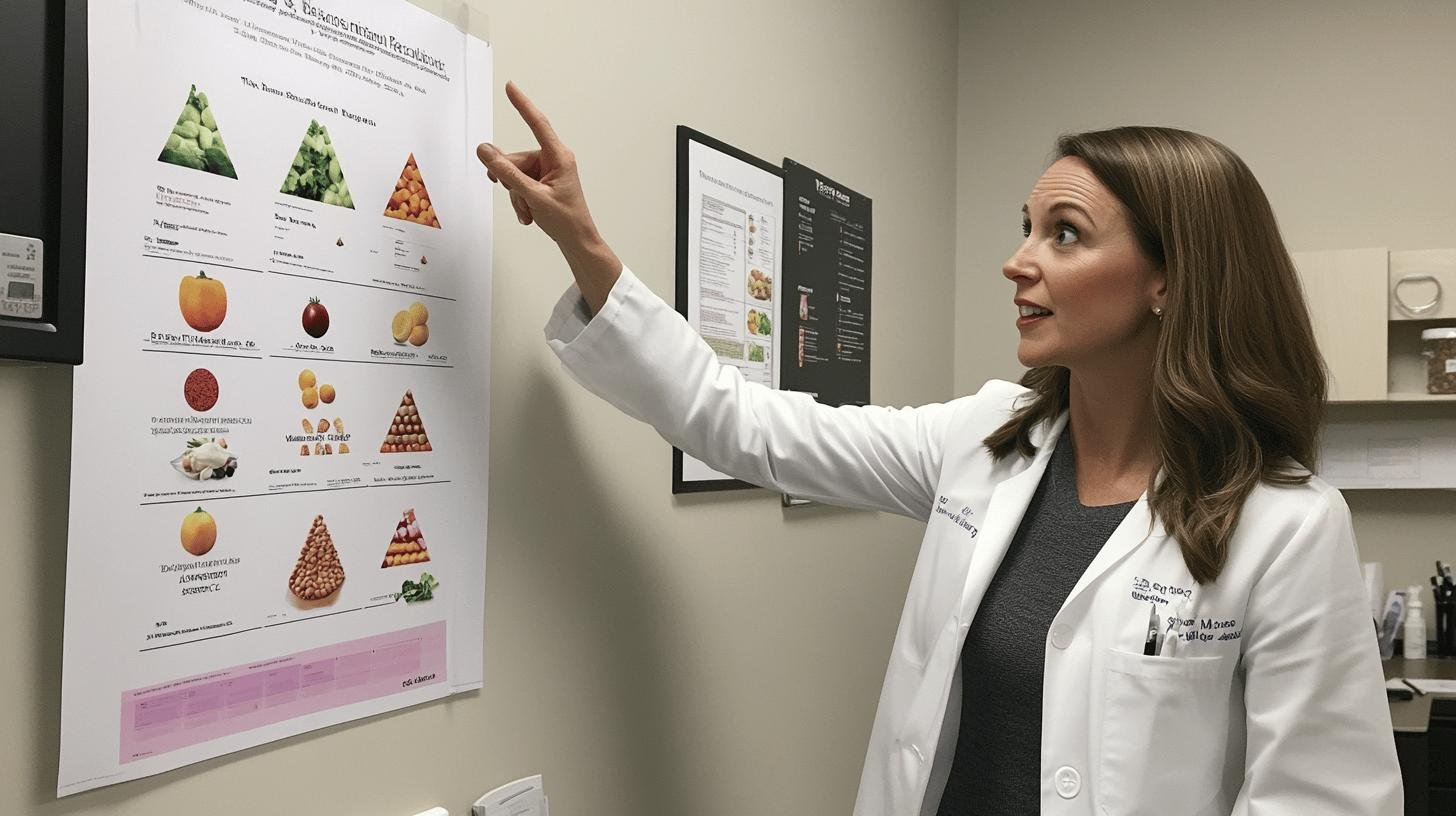TL;DR:
- What is Nutritional Counseling? Personalized dietary advice from registered dietitians/nutritionists for individuals at nutritional risk.
- Key Responsibilities: Dietary assessments, personalized diet plans, nutrition education, lifestyle support, and progress monitoring.
- Benefits: Improved eating habits, personalized diet plans, and education on nutritious cooking.
- Conditions Addressed: Chronic disease management, food allergies, weight management, dietary restrictions, high blood pressure, diabetes, heart health.
- Qualifications of Counselors: Registered Dietitians (RD) or Registered Dietitian Nutritionists (RDN) with a bachelor’s degree and strict certification.
- Direct Primary Care (DPC): Integrates nutritional counseling into personalized care, addressing both physical and mental well-being.
Do you also ask why some folks thrive on their health journeys while others struggle? Here’s a secret: it’s not just about hitting the gym or popping a multivitamin. It’s about what you eat, and that’s where nutritional counseling comes into play. Imagine having a personal food guru tailoring dietary advice just for you, considering your health quirks, favorite foods, and even budget. Intrigued? Stick around as we dig into how nutritional counseling can seriously boost your well-being.
Defining Nutritional Counseling
Nutritional counseling provides personalized dietary advice from registered dietitians or nutritionists. These experts assist individuals at nutritional risk due to health history, dietary habits, chronic illnesses, or medications. To offer tailored guidance, they consider cultural preferences, budgets, medical conditions, and personal goals.
Key Responsibilities of a Nutrition Counselor
- Conduct dietary assessments
- Create personalized diet plans
- Offer nutrition education
- Support lifestyle changes
- Monitor progress
The process begins with an assessment of your eating habits and health history. Counselors discuss your food preferences, budget, medical issues, and personal goals to craft a personalized diet plan. They educate on nutrition, support lifestyle changes, and track your progress to ensure success.
Benefits of Nutritional Counseling

Nutritional counseling can significantly enhance your well-being. It ranges from personalized diet plans to education on nutritious cooking. Let’s explore how this guidance benefits you.
Firstly, improve your eating habits. Wondering what foods suit your body best? A nutrition counselor provides insights into healthy eating habits. They help you understand what’s beneficial, enabling smarter food choices. They also assist in relearning eating skills and building trust in your body’s signals.
Another benefit is personalized diet plans. Rather than relying on generic diets, receive a plan tailored to your needs. Whether you face dietary restrictions, chronic illnesses, or aim to eat healthier, these plans cater to you. Moreover, counselors teach nutritious cooking, ensuring you can create healthy meals at home.
In summary, nutritional counseling positively impacts well-being. It helps you make healthy food choices, manage dietary restrictions, and understand food’s effect on your body. It’s about feeling good from the inside out. If you’re seeking better health and wellness, consider nutritional counseling.
| Benefit | Description |
|————————–|————————————————–|
| Improved eating habits | Guidance to develop healthier eating patterns. |
| Personalized diet plans | Tailored dietary plans to fit individual needs. |
Situations and Conditions Addressed by Nutritional Counseling
Nutritional counseling can transform the management of health conditions. Whether dealing with chronic diseases, food allergies, or weight management, it offers customized plans to maintain health. These plans aim to manage symptoms and enhance well-being.
Key Situations Where Nutritional Counseling Helps:
- Chronic disease management
- Food allergies and intolerances
- Weight management
- Dietary restrictions
- Managing high blood pressure
- Diabetes dietary management
- Heart health diet plans
Nutritional counseling is vital in managing these conditions through personalized dietary guidance. For chronic diseases, it creates plans to alleviate symptoms and improve quality of life. With food allergies, counselors advise on avoiding triggers and finding safe alternatives.
Weight management provides structured plans and supports to achieve and maintain a healthy weight. With a counselor’s help, dietary restrictions due to medical conditions or personal choices become manageable.
Managing conditions like high blood pressure and diabetes requires dietary control, and counseling identifies foods to include or avoid. Heart-health diet plans reduce cardiovascular risk factors, ensuring nutrient-rich heart consciousness.
By addressing various conditions, nutritional counseling empowers informed food choices, symptom management, and a healthier, happier life.
Qualifications and Expertise of Nutritional Counselors

Registered dietitians (RD) or dietitian nutritionists (RDN) are specialists in food and nutrition. They undergo rigorous education and training, often with a bachelor’s degree in dietetics, nutrition, or a related field. Meeting strict certification standards ensures their provision of top-notch, evidence-based nutrition advice. Working with them means you’re in expert hands.
Areas of Expertise
- Evidence-based nutrition
- Personalized dietary assessments
- Nutritional therapy techniques
- Chronic disease management
- Integration of medical advice
Their expertise supports effective nutritional counseling by blending scientific knowledge with practical advice. They create personalized diet plans that meet your unique needs, aiding chronic condition management and health education. This comprehensive approach simplifies achieving health goals.
Direct Primary Care and Nutritional Counseling
Direct primary care (DPC) offers personalized healthcare services without insurance involvement. By removing the middleman, DPC makes healthcare affordable and simple. Imagine a health plan with no insurance approvals or hidden costs—sounds ideal, right?
Now, explore nutritional counseling within this model. DPC emphasizes a holistic approach to health beyond treating symptoms and integrating physical and mental well-being. Nutritional counseling plays a crucial role here. Your DPC doctor seamlessly incorporates nutritional advice into your health plan. Whether managing chronic illnesses, improving diet, or aiding mental health through better eating, nutritional counseling supports you.
The benefits of combining DPC and nutritional counseling are significant. First, you’ll enjoy personalized care. Your doctor and nutritionist collaborate on a tailored health plan without insurance limits. Second, it’s a holistic approach. You’re not merely treating symptoms but addressing root causes for overall well-being. It’s like having a healthcare team focused on every health aspect.
| Aspect | Benefit |
|——————–|———————————————————-|
| Personalized care | Tailored health plans without insurance constraints. |
| Holistic health | Comprehensive approach to physical and mental well-being.|
Final Words
We’ve delved into what nutritional counseling is, highlighting how it involves personalized dietary guidance tailored to individual needs.
Nutrition counselors are pivotal in improving health outcomes, from conducting dietary assessments to offering lifestyle support. We saw how these personalized plans can benefit overall wellness and address specific conditions like chronic diseases and food allergies.
Understanding the qualifications of these experts bolsters trust in their guidance, especially within the direct primary care model.
Here’s to making empowered, healthier choices!
FAQ
Importance of Nutrition Counseling
Nutritional counseling involves personalized dietary guidance from registered dietitians or nutritionists. It targets individuals at nutritional risk due to health history, dietary intake, chronic illness, or medication use.
How does nutrition counseling work?
Nutrition counseling works by assessing your dietary habits, creating a personalized diet plan, educating you about nutrition, and providing ongoing support and monitoring progress.
What is an example of nutrition counseling?
An example of nutrition counseling is a dietitian working with a diabetic patient to create a meal plan that controls blood sugar levels, includes favorite foods and fits the patient’s lifestyle and budget.
What is the difference between a nutrition counselor and a dietitian?
A dietitian has a specialized degree and certification to offer medical nutrition therapy, while a nutrition counselor may have less formal training and focus on general dietary guidance and support.
Is nutritional counseling worth it?
Nutritional counseling is worth it if you want personalized dietary advice to improve health, manage chronic conditions, or achieve specific fitness goals.
What is nutritional counseling for eating disorders?
Nutritional counseling for eating disorders involves working with individuals to develop healthy eating behaviors, understand their relationship with food, and support recovery through balanced nutrition.
What are the types of nutritional counseling?
Types of nutritional counseling include weight management, chronic disease management, sports nutrition, pediatric nutrition, and counseling for eating disorders.
Nutrition Counselor salary
A nutrition counselor’s salary varies based on location, experience, and education. On average, they can earn between $40,000 and $70,000 annually.

